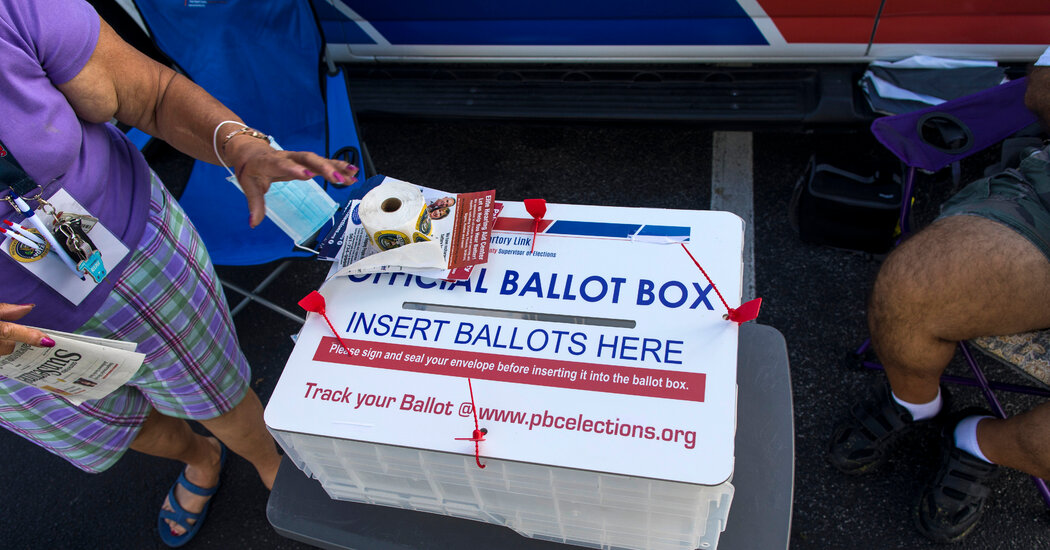
A federal judge in Florida ruled on Thursday that sections of the state’s year-old election law were unconstitutional and racially motivated, and barred the state from making similar changes to its laws in the next decade without the approval of the federal government.
The sharply worded 288-page order, issued by Judge Mark E. Walker of the Federal District Court in Tallahassee, was the first time a federal court had struck down major elements of the wave of voting laws enacted by Republicans since the 2020 election. Finding a pattern of racial bias, Walker in his ruling relied on a little-used legal provision to impose unusual federal restrictions on how a state legislates.
“For the past 20 years, the majority in the Florida Legislature has attacked the voting rights of its Black constituents,” Walker wrote in the decision, which frequently quoted the Rev. Dr. Martin Luther King Jr. Walker argued that the attacks were “part of a cynical effort to suppress turnout among their opponents’ supporters. That, the law does not permit.”
Judge Walker’s decision is certain to be appealed and is likely to be overturned either by the Court of Appeals for the 11th Circuit in Atlanta, which tends to lean conservative, or the Supreme Court, which has sharply limited the federal government’s power to intervene in state election law.
Republicans in Florida immediately denounced the decision. At an appearance in West Palm Beach, Gov. Ron DeSantis called the ruling “performative partisanship” and predicted a reversal on appeal.
“There’s an old saying in law,” said Mr. DeSantis, who has a law degree. “If you have the facts on your side, argue the facts. If you have the law on your side, argue the law. If you have neither, you pound the table. Well, this is the judicial equivalent of pounding the table.”
The ruling targets the portions of the law that limited the use of drop boxes, placed strict rules on voter-registration organizations and forbade some kinds of assistance to Floridians waiting in line to vote. Judge Walker’s order blocks Florida from making changes to those three functions for 10 years without federal sign-off.
Even if fleeting, Judge Walker’s decision represents one of the most aggressive legal broadsides against Republicans in the heated voting rights battles that have followed President Donald J. Trump’s defeat in the 2020 election. The ruling also comes as Democrats and their allies pursue an uphill legal strategy, relying on federal voting protections diminished by the Supreme Court.
In his decision, Judge Walker castigated previous Supreme Court rulings on voting issues and essentially dared the justices to overturn his decision.
“Without explaining itself, the court has allowed its wholly judge-made prudential rule to trump some of our most precious constitutional rights,” the judge wrote.
Judge Walker, who was appointed in 2012 by President Barack Obama, spared few rhetorical flourishes in declaring that Republicans sought to limit Black Floridians’ access to voting. He described Republican lawmakers as offering “conflicting or nonsensical rationales” for the law and argued that they were fundamentally motivated by a partisan drive to win elections.
“Florida has repeatedly sought to make voting tougher for Black voters because of their propensity to favor Democratic candidates,” he wrote.
Judge Walker’s decision pointed to comments made by state lawmakers during floor debate that described voters as “lazy” for failing to make it to the polls.
The Republican lawmakers “trotted out one of the oldest racial tropes known to man in response to concerns about minority disenfranchisement,” Judge Walker wrote.
Wilton Simpson, the Republican president of the Florida Senate, said in a statement that the ruling was “highly unprofessional, inaccurate and unbecoming of an officer of the court.”
The state’s Democrats, locked out of power, celebrated the decision but remained wary that it might not withstand appeals.
“It’s been a tough few years for those of us who think politicians shouldn’t be making it harder for people they don’t like to be able to vote, so today is a big deal,” said Raymond Paultre, executive director of the Florida Alliance, a statewide network of progressive donors. “The fear is that it goes to the 11th Circuit and they fall in line with what Republicans want.”
With his ruling, Judge Walker placed a relatively obscure element of the Voting Rights Act of 1965 at the center of the legal debate over federal protection of voting rights.
For decades, the law required scores of jurisdictions across the country, and especially in the South, to clear voting law changes with the Justice Department. But in 2013, the Supreme Court invalidated the preclearance rules in a case known as Shelby County v. Holder.
Judge Walker’s decision puts Florida under the federal restrictions, using Section 3 of the act. The provision, known as “bail-in,” allows judges to impose additional federal oversight of election law, if states or local governments are found to be repeat offenders in racial discrimination cases, said Travis Crum, a law professor at Washington University in St. Louis.
Understand the Battle Over U.S. Voting Rights
Why are voting rights an issue now? In 2020, as a result of the pandemic, millions embraced voting early in person or by mail, especially among Democrats. Spurred on by Donald Trump’s false claims about mail ballots in hopes of overturning the election, the G.O.P. has pursued a host of new voting restrictions.
Courts have used the “bail-in” provision sparingly. Before the Florida ruling, New Mexico and Arkansas were the only states ordered by judges to submit to preclearance requirements, both decades ago. A few counties and cities have as well, Professor Crum said.
Some Democrats have tried to persuade courts to use bail-in requirements on voter identification laws and redistricting maps in North Carolina and Texas, but federal judges have declined to do so in major cases.
The strategy runs the risk of putting voting rights cases before the Supreme Court, where the conservative majority could further weaken the Voting Rights Act.
“From a realistic perspective, it’s unlikely that the 11th Circuit or the Supreme Court would agree with the district court that there was racially discriminatory intent in Florida,” said Nicholas Stephanopoulos, a Harvard Law School professor and an expert on election law. “There’s a lurking fear that the same court that decided Shelby County might decide that bail-in is unconstitutional.”
The ruling on Thursday upheld one of many legal challenges to the voting laws passed by Republican-led legislatures last year. Voting rights groups and Democrats have accused Republicans of using laws that disproportionately target Black voters and other communities of color to achieve a partisan advantage.
Similar arguments were made in Georgia. There, voting rights groups argued that new mail-voting restrictions would give Republicans an edge by targeting Black voters, who overwhelmingly vote Democratic. But experts note that the legal theory used by Judge Walker may not be shared by other justices.
“All things being equal, that if the Florida law is intentional discrimination, the Georgia law should be intentional discrimination,” said Jonathan Greenbaum, chief counsel for the Lawyers’ Committee for Civil Rights Under Law. “But there’s no guarantee that our judge in Georgia or the judges in the Texas cases are going to look at it the same way.”
Judge Walker has rebuked Florida elections laws before, often with sharp language against the state’s Republican leaders. In 2018, he ruled that officials in 32 counties with Puerto Rican populations had to provide Spanish-language voting materials — and made reference to how voting rights cases before him had started to resemble the movie “Groundhog Day.”
Mr. DeSantis has repeatedly dismissed some trial courts as politically biased and insisted that his administration’s policies and the Legislature’s laws will be upheld by more conservative appeals courts.
“In the trial courts in Tallahassee, state and federal, we typically lose if there’s a political component to it, but then in the appeals court, we almost always win,” Mr. DeSantis said last fall after a state appeals court allowed a ban on school mask mandates to remain in place, overturning a lower court’s ruling.




